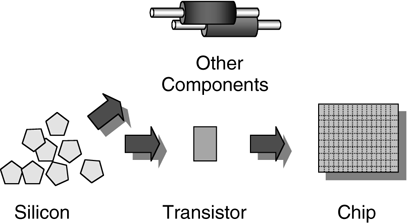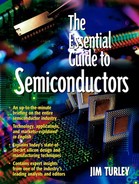Some Words To Know
Most businesses have their own specialized vocabulary that's impenetrable to outsiders. Plumbers, doctors, miners, and pilots all use words and phrases that the rest of us don't understand. It's the same with chip makers and designers. Most of their professional lingo isn't of interest to us here, but some of these words have leaked into general usage. I'll define others throughout this book as we need them.
What's a Chip?
The most common word you've undoubtedly already heard related to semiconductors is chip, as in silicon chip, memory chip, or computer chip. Chips are little flakes of silicon that have been carefully worked on in such a way that they do amazing things. There are millions of different kinds of chips made for cell phones, antilock brake systems, televisions, radios, and innumerable other devices. Memory chips and microprocessors are both examples of chips. Big or small, all chips are made in more or less the same way, from the same basic materials, namely silicon and aluminum.
What's Silicon?
Silicon is a perfectly normal substance: It's sand. Believe it or not, all the world's advanced silicon chips are basically made out of sand. Whether the chips are used in computers, satellites, cell phones, video games, or household thermostats, they all have the same humble beginnings on a beach somewhere. (Technically, industrial-grade silicon is specially manufactured, not scooped off the beach with a pail, but it's the same stuff either way.)
Here is one important point to remember: silicon is not the same as silicone. Silicon rhymes with “drawn” and is the sandy stuff chips are made of. Silicone rhymes with “throne” and is the stuff that cosmetic surgeons use. You can also find silicone grease at the hardware store; it makes good weatherproofing and stops squeaky hinges. It's an unfortunate trick of the English language that these two words are so close together. They really have nothing in common and are not related at all. You're sure to mark yourself as an amateur if you accidentally mention “silicone chips.”
Silicon Valley, of course, is the nickname for the Santa Clara Valley of California. It's a roughly 50-mile stretch between San Francisco (at the north end) and San Jose (at the south end). There's no natural silicon there, although judging from some of the inhabitants, there is a fair amount of silicone.
What's a Semiconductor?
Semiconductor is a word that only chemists should really be using. It means a chemical or a substance that conducts electricity, but not very well. Some materials, like copper, conduct electricity quite well. That's why houses are built with copper wires. Other materials, like rubber and plastic, don't conduct electricity at all. That's why power cords are plastic on the outside: to protect us from the electricity inside. Finally, there's a third class of materials, the semiconductors, that conduct electricity better than plastic but not as well as copper. For reasons it's not important to explain, this makes semiconductors great materials for building chips, and silicon is one of the best semiconductors available.
We also use the word semiconductor to refer to things made from silicon (see Figure 1.1). For example, in this book you'll read about computer chips “and other semiconductors.” That doesn't mean materials other than silicon. It means manufactured items that are made from silicon. In that sense, semiconductor is basically the same as chip or component.
Figure 1.1. Practically all electronic devices are made from purified silicon: sand. The silicon is processed into a number of different shapes and designs to create chips and other components. There are millions of different kinds of chips, as well other types of components.

Not all semiconductors are chips; casino operators might say not all chips are semiconductors, either. The only other good joke in this category involves a railroad conductor who had his hours cut back: He became a semiconductor.
What's a Transistor?
Everybody has heard of a transistor radio (at least, everyone of a certain age), but how many know what a transistor really is? Is it a big thing or a little thing? Good or bad? The answers to these questions are little and good.
Transistors are the smallest, most basic building blocks in most electronics. They are the bricks from which the soaring towers are made. Transistors can be combined to make nearly anything an electrical engineer can imagine. An electrical engineer might describe a day's work as a 5,000-transistor circuit the way a cook might enthuse over a three-egg omelet.
Transistors can be made as big or as small as you like, but the overwhelming trend is to make them smaller. The first transistors, created in the 1950s, were as big as your thumb. Modern transistors are—hold your breath—about one-millionth of an inch across. You could easily inhale a thousand transistors and not know it. You can also fit more than 10 million transistors on your fingernail, and in Chapter 4 we'll see exactly how these modern miracles are put together.
What's an IC?
IC (integrated circuit) is just another term for a chip. You can use the terms IC and chip interchangeably.
What's a Component?
A component is similar to a chip, but the term is a little broader. All chips are components, but not all components are chips. Pretty much any electrical type of device you might make from silicon is a component. Chips are the most common type of component, but there are other types of electrical components, too, like resistors and capacitors.
What's a Circuit?
Circuit is a medium-strength technical word to describe an electronic design. Architects create blueprints; electrical engineers create circuits. To these people, electricity always travels in a circle, like horses around a track. Therefore, any electronic design is called a circuit. Whether it's a big design (like an entire television) or a small design (like a single chip), it's still called a circuit. In this book, you'll see circuit used as a catch-all term for many different kinds of electrical designs.
